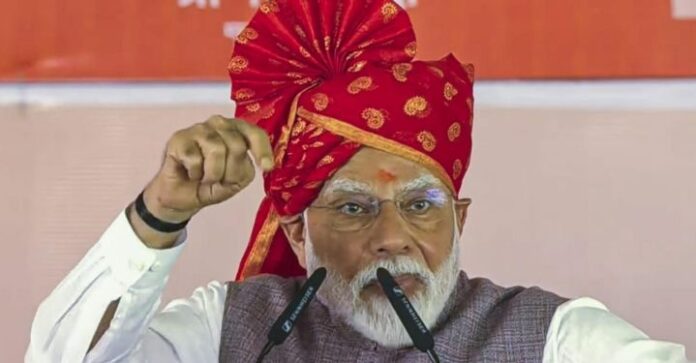In a bold and fiery address in Bikaner, Rajasthan, Prime Minister Narendra Modi delivered one of his strongest statements yet on national security, stating unequivocally that “Pakistan was forced to kneel” in the wake of India’s military operation following a terrorist attack in Kashmir. The declaration, laden with symbolism and strategic intent, was part of his larger narrative ahead of the elections, positioning India’s national security as a top priority of his administration.
The remarks were made in the aftermath of “Operation Sindoor”—a rapid and precise military response to the Pahalgam terror attack, believed to be orchestrated by Pakistan-based terrorist organizations. According to the Prime Minister, the Indian forces executed a series of strikes that destroyed nine major terrorist training facilities within a span of just 25 minutes.
A Turning Point in Counter-Terror Strategy
Addressing thousands in Bikaner, PM Modi characterized the operation not just as a military retaliation, but as a symbol of a “new India” that does not tolerate provocation. “Today, India responds to bullets with barood (gunpowder), and that too, swiftly and with accuracy,” he stated.
Operation Sindoor marked a notable departure from traditional diplomatic responses. This was a carefully executed joint operation involving the Indian Army, Navy, and Air Force. The goal was clear: dismantle terror infrastructure and send a message to Pakistan’s military establishment that India would no longer play defense when its citizens are attacked.
The Prime Minister noted that this approach had forced Pakistan into an uncomfortable position. “For years, they believed they could use terrorism as a proxy weapon without facing consequences. But not anymore. They’ve been made to kneel,” he thundered, receiving thunderous applause from the gathered crowd.
“No More Talks — Only Action”
PM Modi used the Bikaner rally as a platform to redefine India’s diplomatic posture towards Pakistan. In his words, “No more talks, no more trade. The only discussion India is willing to have is about reclaiming Pakistan-occupied Kashmir.”
This marked a strong reiteration of India’s position that dialogue cannot coexist with terrorism. In recent years, PM Modi’s administration has pursued an assertive foreign policy, including cross-border surgical strikes in 2016 and the Balakot airstrikes in 2019. Operation Sindoor appears to be a continuation of that doctrine.
By removing ambiguity and declaring that talks with Pakistan are off the table until terrorism is dismantled, Modi has sought to further isolate Pakistan internationally and reinforce India’s image as a responsible power taking legitimate actions in self-defense.
“Sindoor in Veins, Not Blood”: A Call to National Unity
Among the most quoted lines from PM Modi’s speech was his passionate statement: “Not blood, but sindoor flows in my veins.” Here, “sindoor”—a red powder traditionally worn by married Hindu women—was used as a metaphor for sacrifice, patriotism, and devotion to the nation.
This statement served two purposes. First, it personalized the idea of sacrifice, suggesting that for him, national security isn’t a policy matter—it’s personal. Second, it invoked cultural symbolism, connecting emotionally with his audience and emphasizing the sacredness of India’s sovereignty.
Modi positioned himself as the custodian of India’s security, suggesting that under his leadership, no threat will go unanswered. It was a clear signal to both domestic audiences and foreign adversaries: India’s patience is not weakness, and its responses will be swift and strategic.
Strategic and Political Context
The timing of the Bikaner rally was no coincidence. With national elections approaching, the Prime Minister’s message sought to consolidate support by highlighting the government’s decisive actions on defense. Over the years, Modi has successfully crafted a narrative of a strong leader who places national security at the heart of governance.
The focus on military success, anti-terror operations, and border integrity resonates with a wide base of voters across the political spectrum. In a region like Rajasthan, which shares a border with Pakistan and has historically supported strong nationalistic leadership, this message found fertile ground.
Modi also outlined how border villages, often neglected in previous administrations, were now being developed under schemes like “Vibrant Villages,” which aim to bring infrastructure, jobs, and dignity to India’s frontier citizens.
Operation Sindoor: Details and Implications
Operation Sindoor, as detailed by PM Modi, was not a symbolic gesture but a hard-hitting strategic move. Intelligence reports indicated that these camps were responsible for planning and training operatives for attacks inside India. The Indian Armed Forces used a mix of aerial and ground-based assets to ensure minimal collateral damage while delivering maximum impact.
Experts believe this operation reflects a shift in doctrine—from reactive to pre-emptive defense. The rapid execution of the strikes, coupled with international outreach afterward, ensured that India retained diplomatic credibility while taking firm action.
Moreover, the operation was reportedly coordinated to avoid escalation, showing that India remains committed to peace, but not at the cost of tolerating aggression.
Regional and Global Response
While there was no official reaction from Pakistan at the time of the speech, international observers took note. Several countries reiterated their support for India’s right to self-defense, while also urging both sides to exercise restraint to avoid further escalation.
The operation also had a subtle message for the global community: India is prepared to act decisively against terrorism, and it expects international cooperation in identifying and dismantling state-sponsored terror networks.
Conclusion
Prime Minister Modi’s Bikaner speech was more than a campaign rally—it was a declaration of India’s evolving defense philosophy. By asserting that Pakistan was “forced to kneel,” he signaled a new era of strategic clarity. Gone are the days of waiting for global sympathy. India now acts swiftly, with precision, and with purpose.
The message was clear: National security is not negotiable. Terrorism will be met with strength. And under his leadership, India’s borders—and its people—will be fiercely protected.
As election fever builds, such narratives are likely to shape public discourse, not only on security but also on leadership and accountability in an increasingly volatile region.

